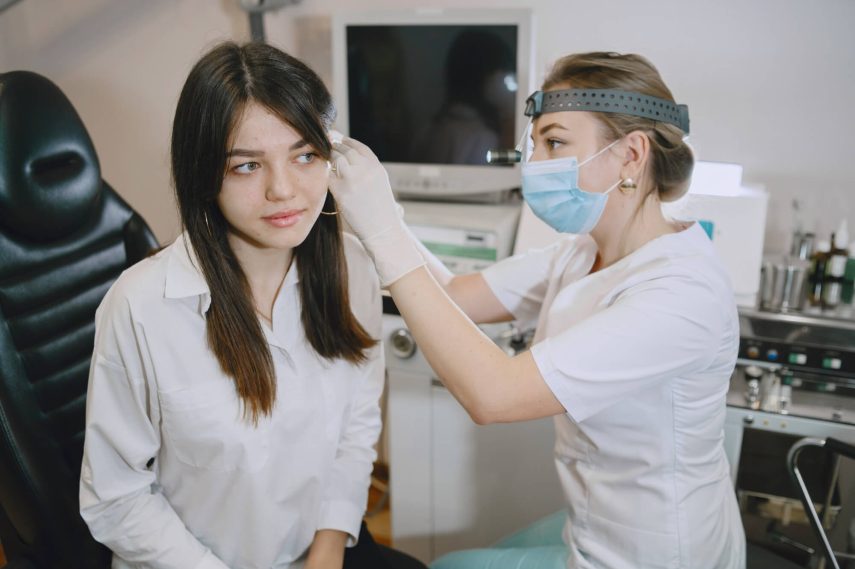
Understand Swimmer’s Ear, its symptoms, causes, and the importance of consulting a primary care doctor in Southington, CT, for prompt and effective treatment.
The joy of swimming comes naturally to us. However, this pleasant activity can sometimes lead to an uncomfortable condition known as Swimmer’s Ear. Understanding its symptoms, causes, and when to consult your primary care doctor in Southington, CT, is vital to ensure a swift recovery and return to your favorite water activities.
Swimmer’s Ear, medically termed Otitis Externa, is an infection of the outer ear canal, which is the tube running from your eardrum to the outside of your ear. This condition is commonly caused by water remaining in the ear after swimming, creating a moist habitat for bacteria to grow. It’s a problem many are familiar with, especially those who frequent water bodies. The symptoms usually start with mild irritation, itching, and a feeling of fullness in the ear, which can escalate to more severe symptoms such as pain, redness, swelling, and discharge if left untreated.
It’s crucial to address the symptoms of Swimmer’s Ear early to prevent it from worsening. A consultation with a reputable primary care doctor in Southington, CT, can provide an accurate diagnosis and a tailored treatment plan to alleviate discomfort and tackle the infection effectively, ensuring that your love for water activities remains undeterred.
Swimmer’s Ear, or Otitis Externa, often begins with a mere itch, but if left unnoticed or untreated, it can escalate into a more severe condition with potentially serious symptoms. Understanding the signs of Swimmer’s Ear is the initial step towards seeking appropriate medical help. If you are a frequent swimmer or engage in activities that expose your ears to water or moisture, identifying these symptoms can prompt you to visit a reputable primary care doctor in Southington, CT, ensuring a timely diagnosis and treatment.
These initial symptoms might be overlooked or mistaken for minor irritation. However, consulting with a trusted primary care doctor in Southington, CT, at this stage can help diagnose and treat the condition before it worsens.
Without proper treatment, the infection can progress, and the symptoms can become more severe, such as:
In neglected or severe cases, the infection can spread to other parts of the ear and surrounding tissues, leading to:

Understanding the various causes and risk factors of Swimmer’s Ear can help in preventing the infection or seeking timely treatment from a reputable primary care provider in Southington, CT, like Docs Primary Care – Southington.

Chemicals found in certain products can irritate the skin in the ear canal and lead to Swimmer’s Ear. These include:
Physical irritation from objects or actions can also contribute to the development of Swimmer’s Ear:
Individuals with skin conditions like eczema, psoriasis, or seborrheic dermatitis are more prone to developing Swimmer’s Ear, as their skin might already be irritated or broken, allowing for easy entry of microbes.
Aloe Vera has natural anti-inflammatory and soothing properties. Applying a small amount of aloe vera gel around the opening of the ear canal can help reduce irritation and soothe the skin.
Preventing Swimmer’s Ear requires a blend of lifestyle adjustments and awareness, particularly if you are an avid swimmer or live in humid climates like Southington, CT. A trusted primary care doctor in Southington, CT, can provide personalized strategies to help avoid the discomfort and potential complications associated with Swimmer’s Ear.

Swimmer’s Ear, though often mild at the outset, can escalate into a severe infection if neglected. Knowing when to consult a reputable primary care doctor from a reliable clinic like Docs Primary Care – Southington is paramount in receiving timely and effective treatment.
Seeking medical attention at an urgent care center in Southington, CT, especially for unsettling symptoms like nausea, can be a new experience for many. However, knowing what to expect can alleviate apprehensions and ensure you are well-prepared for your visit. Here’s a step-by-step walkthrough of what typically occurs during a visit to an urgent care center in Southington:
Once you start experiencing the early signs of Swimmer’s Ear, such as itching, mild pain, or a feeling of fullness in the ear, it’s prudent to schedule an appointment with a trusted primary care doctor in Southington, CT. Early intervention can significantly reduce the chances of the infection progressing to a more severe stage.
If the initial symptoms persist or worsen over time, it is a clear indication that you need to consult with a healthcare professional. Increased pain, discharge, redness, swelling, or temporary hearing loss are signs that the infection may advance.
Sometimes, individuals might attempt to treat the initial symptoms with over-the-counter ear drops. If there’s no improvement or the condition worsens after using such treatments, it’s time to consult a reliable primary care doctor in Southington, CT.
Individuals with pre-existing skin conditions like eczema, psoriasis, or those with a history of recurrent ear infections should consult their primary care doctor at the onset of symptoms. Their existing conditions might complicate Swimmer’s Ear, necessitating professional medical intervention.
Experiencing muffled hearing or a significant reduction in hearing capability is a serious symptom. It’s crucial to seek medical attention from a seasoned primary care doctor in Southington, CT, to prevent potential long-term hearing issues.
Fever or swollen lymph nodes are signs of a more serious infection spreading beyond the ear. Immediate medical attention is necessary in such cases.
If you are prone to Swimmer’s Ear or engage in activities that expose you to the risk factors, consulting with a primary care doctor in Southington, CT, for personalized preventive advice is prudent. They can provide tailored strategies to help prevent Swimmer’s Ear based on your circumstances and medical history.
Addressing Swimmer’s Ear (Otitis Externa) effectively requires a tailored treatment plan that not only alleviates the symptoms but also tackles the underlying infection. Your trusted primary care doctor in Southington, CT, is equipped to provide a comprehensive treatment strategy based on the severity and the causative agent of the infection.
Your seasoned primary care doctor in Southington, CT, will determine the type of ear drops based on the nature of the infection.
Professional ear cleaning by a reputable primary care doctor in Southington, CT, can help remove any discharge or debris and promote healing. This procedure is delicate and should only be performed by a medical professional to avoid further irritation or injury.
In extreme cases, a minor surgical procedure to drain the ear may be necessary. This procedure would be performed by a specialist, often on the referral of your primary care doctor in Southington, CT.
In mild cases of Swimmer’s Ear, home remedies provide some relief. However, it’s crucial to remember that while these remedies may alleviate symptoms, they do not address the underlying infection. It’s always advisable to consult with a primary care doctor for a proper diagnosis and treatment plan. Here are some home remedies you might find beneficial:
Applying warm compresses to the affected ear can help alleviate pain by promoting blood flow to the area, which may help speed up the healing process. Ensure the compress is warm, not hot, to avoid burns.
A homemade ear drop solution made of equal parts white vinegar and rubbing alcohol can be effective in preventing bacterial growth and keeping the ear dry. The acidity of vinegar helps to restore the ear’s natural environment, making it less hospitable for bacteria, while rubbing alcohol helps to dry out the ear canal.
A few drops of hydrogen peroxide can help clean the ear and combat bacterial growth. However, this should be done cautiously, as hydrogen peroxide can irritate sensitive skin.
Warm olive oil drops can help to soothe irritation in the ear canal. Ensure the oil is warm, not hot, and only use a clean dropper to administer the drops.
Garlic has natural antimicrobial properties. Garlic oil drops can help reduce bacterial growth and alleviate discomfort.
Aloe Vera has natural anti-inflammatory and soothing properties. Applying a small amount of aloe vera gel around the opening of the ear canal can help reduce irritation and soothe the skin.
These remedies can offer relief in mild cases or serve as supplementary measures alongside medical treatment. For persistent or worsening symptoms, it’s crucial to seek professional medical care to prevent further complications.
Yes, if left untreated, Swimmer’s Ear can lead to chronic Otitis Externa, deep tissue infections, bone and cartilage damage, or even more serious systemic infections. It’s essential to consult a primary care doctor at the onset of symptoms to receive appropriate treatment and prevent potential complications.
Swimmer’s Ear can affect individuals of all ages, but it’s commonly seen in children and teenagers, who tend to spend more time in water activities. However, adults and the elderly can also develop the condition, especially if they have pre-existing skin conditions or impaired immune systems.
Swimmer’s Ear is not typically contagious as it is often caused by bacteria or fungi in the environment or the ear canal. However, suppose the infection is caused by certain types of bacteria or fungi that are contagious. In that case, it may be spread through contact with contaminated water or personal items.
It’s advisable to avoid swimming until the infection clears up to prevent aggravating the condition. Immersing in water can introduce more bacteria into the already infected ear canal. Your primary care doctor can provide a more accurate timeline for when it’s safe to resume swimming based on your specific condition.
Yes, preventive measures like wearing swim ear plugs, drying your ears thoroughly after swimming, and avoiding inserting anything into your ear canal can significantly reduce your risk of developing Swimmer’s Ear. Regular check-ups with your primary care doctor can help maintain good ear health.
Allergies can cause skin irritation and itching, which might lead to a Swimmer’s Ear if one scratches or irritates the skin in the ear canal. Additionally, some allergic reactions can cause the ear canal to swell or become blocked, creating a conducive environment for bacterial or fungal growth, leading to Swimmer’s Ear.
Swimmer’s Ear, though common, requires prompt attention and appropriate care to prevent complications. Knowledge about its symptoms, causes, and treatment options is essential. For personalized advice and effective treatment, consider visiting Docs Primary Care – Southington, a trusted health clinic in Southington, CT, where seasoned primary care doctors are available to assist you in maintaining optimal ear health and enjoying your water adventures with peace of mind.


During this surge in COVID-19 cases, our primary focus is meeting the high demand for tests, and we are seeing higher than usual wait times. This means we are unable to answer most phone calls. Please know that our teams are working very hard during this time to care for as many patients as safely as possible. Please click the button below for answers to common questions. We appreciate your understanding.